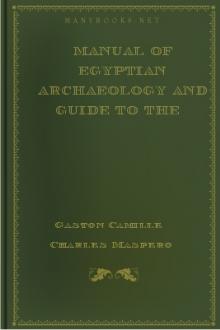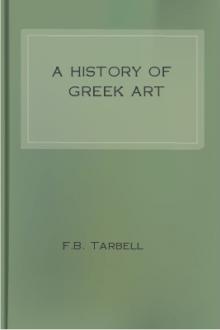Ancient America, in Notes on American Archaeology - John D. Baldwin (story books to read .txt) 📗

- Author: John D. Baldwin
- Performer: -
Book online «Ancient America, in Notes on American Archaeology - John D. Baldwin (story books to read .txt) 📗». Author John D. Baldwin
In the first place, Brasseur de Bourbourg claims that there is in the old Central American books a constant tradition of an immense catastrophe of the character supposed; that this tradition existed every where among the people when they first became known to Europeans; and that recollections of the catastrophe were preserved in some of their festivals, especially in one celebrated in the month of Izcalli, which was instituted to commemorate this frightful destruction of land and people, and in which “princes and people humbled themselves before the divinity, and besought Him to withhold a return of such terrible calamities.” This tradition affirms that a part of the continent extending into the Atlantic was destroyed in the manner supposed, and appears to indicate that the destruction was accomplished by a succession of frightful convulsions. Three are constantly mentioned, and sometimes there is mention of one or two others. “The land was shaken by frightful earthquakes, and the waves of the sea combined with volcanic fires to overwhelm and ingulf it.” Each convulsion swept away portions of the land, until the whole disappeared, leaving the line of the coast as it is now. Most of the inhabitants, overtaken amid their regular employments, were destroyed; but some escaped in ships, and some fled for safety to the summits of high mountains, or to portions of the land which, for the time, escaped immediate destruction. Quotations are made from the old books in which this tradition is recorded which appear to verify his report of what is found in them. To criticise intelligently his interpretation of their significance, one needs to have a knowledge of those books and traditions equal at least to his own.
In the second place, he appeals to the story of Atlantis, preserved in the annals of Egypt, and related to Solon by the priests of Sais. It is stated in Plutarch’s life of Solon that while in Egypt “he conferred with the priests of Psenophis, Sonchis, Heliopolis, and Sais, and learned from them the story of Atlantis.” Brasseur de Bourbourg cites Cousin’s translation of Plato’s record of this story as follows:
“Among the great deeds of Athens, of which recollection is preserved in our books, there is one which should be placed above all others. Our books tell that the Athenians destroyed an army which came across the Atlantic Sea, and insolently invaded Europe and Asia; for this sea was then navigable, and beyond the strait where you place the Pillars of Hercules there was an island larger than Asia [Minor] and Libya combined. From this island one could pass easily to the other islands, and from these to the continent which lies around the interior sea. The sea on this side of the strait (the Mediterranean) of which we speak resembles a harbor with a narrow entrance; but there is a genuine sea, and the land which surrounds it is a veritable continent. In the island of Atlantis reigned three kings with great and marvelous power. They had under their dominion the whole of Atlantis, several other islands, and some parts of the continent. At one time their power extended into Libya, and into Europe as far as Tyrrhenia; and, uniting their whole force, they sought to destroy our countries at a blow, but their defeat stopped the invasion and gave entire independence to all the countries on this side of the Pillars of Hercules. Afterward, in one day and one fatal night, there came mighty earthquakes and inundations, which ingulfed that warlike people; Atlantis disappeared beneath the sea, and then that sea became inaccessible, so that navigation on it ceased on account of the quantity of mud which the ingulfed island left in its place.”
This invasion took place many ages before Athens was known as a Greek city. It is referred to an extremely remote antiquity. The festival known as the “Lesser Panathenæa,” which, as symbolic devices used in it show, commemorated this triumph over the Atlantes, is said to have been instituted by the mythical Erichthonius in the earliest times remembered by Athenian tradition. Solon had knowledge of the Atlantes before he went to Egypt, but he heard there, for the first time, this account of their “island” and of its disappearance in a frightful cataclysm. But Atlantis is mentioned by other ancient writers. An extract preserved in Proclus, taken from a work now lost, which is quoted by Boeckh in his commentary on Plato, mentions islands in the exterior sea beyond the Pillars of Hercules, and says it was known that in one of these islands “the inhabitants preserved from their ancestors a remembrance of Atlantis, an extremely large island, which for a long time held dominion over all the islands of the Atlantic Ocean.”
Brasseur de Bourbourg claims that these traditions, on both sides of the Atlantic, mean the same thing. The “island of Atlantis,” larger than Libya and Asia Minor together, was the extended portion of the American continent. These concurring traditions can not be devoid of historical significance. The constant references by ancient Greek writers to the Atlantes, who are always placed at the extremity of Europe and Africa, on the ocean which bears their name, may reasonably be regarded as vague and faded recollections of such a history connected with that ocean as that implied by what was said of their island in the annals of Egypt. In support of his view of what is meant by the traditions, he adds this philological argument:
“The words Atlas and Atlantic have no satisfactory etymology in any language known to Europe. They are not Greek, and can not be referred to any known language of the Old World. But in the Nahuatl language we find immediately the radical a, atl, which signifies water, war, and the top of the head. (Molina, Vocab. en lengua mexicana y castellana, etc.) From this comes a series of words, such as atlan, on the border of or amid the water, from which we have the adjective Atlantic. We have also atlaça, to combat or be in agony; it means likewise to hurl or dart from the water, and in the preterit makes atlaz. A city named Atlan existed when the continent was discovered by Columbus, at the entrance of the Gulf of Uraba, in Darien, with a good harbor; it is now reduced to an unimportant pueblo named Acla.”
In the third place, he quotes opinions expressed without any regard whatever to his theory to show that scientific men who have considered the question believe that there was formerly a great extension of the land into the Atlantic in the manner supposed. The first quotation is from Moreau de Saint-Mery’s “Description topographique et politique de la Partie Espagnole a l’Isle de Saint-Domingue,” published in 1796, as follows:
“There are those who, in examining the map of America, do not confine themselves to thinking with the French Pliny that the innumerable islands situated from the mouth of the Orinoco to the Bahama Channel (islands which include several Grenadins not always visible in very high tides or great agitations of the sea) should be considered as summits of vast mountains whose bases and sides are covered with water, but who go farther, and suppose these islands to be the tops of the most elevated of a chain of mountains which crowned a portion of the continent whose submersion has produced the Gulf of Mexico. But to sustain this opinion it must be added that another vast surface of land which united the islands of this archipelago to the continent, from Yucatan to the mouth of the Orinoco, was submerged in the same way, and also a third surface which connected them with the peninsula of Florida and with whatever land may have constituted the northern termination; for we can not imagine that these mountains whose summits appear above water stood on the terminating line of the continent.”
He quotes, also, another authority which “can not be suspected,” namely, M. Charles Martins, who said, in the Revue des Deux Mondes for March 1, 1867, “Now, hydrography, geology, and botany agree in teaching us that the Azores, the Canaries, and Madeira are the remains of a great continent which formerly united Europe to North America.” He could have added other quotations in the same strain. Those geologists who believe that “our continents have long remained in nearly the same relative position” would probably give the supposed change a much greater antiquity than Brasseur de Bourbourg would be likely to accept; and the geological “Uniformitarians” would deny with emphasis that so great a change in the shape of a continent was ever effected by such means, or with such rapidity as he supposes. But the latest and most advanced school of geological speculation does not exclude “Catastrophism,” and, therefore, will not deny the possibility of sudden and great changes by this method.
Doubtless the antiquity of the human race is much greater than is usually assumed by those whose views of the past are still regulated by mediæval systems of chronology. Archæology and linguistic science, not to speak here of geology, make it certain that the period between the beginning of the human race and the birth of Christ would be more accurately stated if the centuries counted in the longest estimate of the rabbinical chronologies should be changed to millenniums. And they present also another fact, namely, that the antiquity of civilization is very great, and suggest that in remote ages it may have existed, with important developments, in regions of the earth now described as barbarous, and even, as Brasseur de Bourbourg supposes, on ancient continents or portions of continents now out of sight below the surface of the oceans. The representation of some speculators that the condition of the human race since its first appearance on earth has been a condition of universal and hopeless savagery down to a comparatively modern date, is an assumption merely, an unwarranted assumption used in support of an unproved and unprovable theory of man’s origin. Its use in the name of science by advocates of this theory, like the theory itself, shows that the constructive power of fancy and imagination will sometimes supersede every thing else, and substitute its ingenious constructions for legitimate conclusions, even in scientific speculation.
We may claim reasonably that Brasseur de Bourbourg’s Atlantic theory is not proved, and on this ground refuse to accept it. So far as appears, it is a fanciful theory which can not be proved. No one is under obligation to attempt disproving it. It may, in some cases, win supporters by enlisting in its favor all the forces of imagination, to which it appeals with seductive plausibility. On the other hand, it will be rejected without much regard to what can be said in its favor, for it interferes with current unreasoning beliefs concerning antiquity and ancient history, and must encounter vehement contradiction from habits of thought fixed by these beliefs. True, some of the stock views of antiquity, by which it will be earnestly opposed, are themselves far more destitute of foundation in either fact or reason; but this will make no difference, as the habit of never allowing them to be subjected to the searching power of reason does not permit such persons either to believe or deny any thing connected with this topic in a reasonable manner.
Some of the uses made of this theory can not endure criticism.





Comments (0)